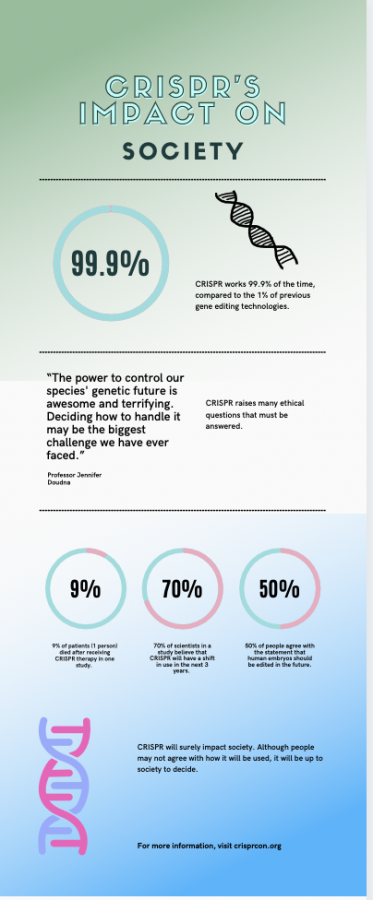Gene editing and the reawakening of the eugenics debate
CRISPR will change society in the future. Scientists have different views on the direction CRISPR will take.
May 21, 2021
The gene editing tool CRISPR-Cas9 has been on the news a lot lately, especially with its potential use to help treat COVID-19 and genetic diseases. It has been praised by the media and by the public alike, with its discoverers even winning the 2020 Nobel Prize.
With its infinite potential and possibility for medical technology and advancement, there is reason to be optimistic. Some scientists and researchers even believe that it may even cure cancer in the future.
However, just like any other tool, with the emergence of gene editing, there may be unintended consequences, especially affecting society at large. One of the lesser known controversies is CRISPR’s relation with the eugenics debate.
Eugenics, or predetermined reproduction to produce “desirable” traits, has been a topic of discussion for many decades. Even in the early 1900s, America is in the middle of a eugenics campaign, supported by many politicians like Theodore Roosevelt.
However, the question must be asked: who determines what “desirable” means? There is no easy answer to this question, and thus, eugenics has faded into obscurity over time.
With the discovery of CRISPR, that discussion must be reopened.
Genetic counselor Shari Alpern explains, “The potential risks could come from unregulated use of the technology.”
She is referring to the possibility of such things as designer babies or even genetically engineered cosmetics. Without regulation, there is the possibility of altering a person’s genes to change appearance, giving rise to the massive amounts of gene editing to change appearance to what society believes is ideal.
“Eugenics would be a complicated problem because if people do have the right to decide what’s ideal, then there is going to be a lot more social consequences. A lot of people today are already struggling about their image and appearance because of social media, and if given the chance to like designer baby, which considering how expensive it is to raise a child, this is probably going to be only available to the wealthy, this is really going to affect everyone else,” explains Sarah Zhang (‘23).
With the current pace of science and CRISPR, there is little doubt that rules and regulations are needed.
“Scientists regulate each other very loosely. There are some things which are the ability to publish and be a part of the international scientific community that can be used to regulate, such as not being able to be hired by a research facility ever again or not ever going to be published again. That is all we have. There is no international body to regulate things,” explains Ariana Hirsh, a lab manager working at Innovatives Genomics Institute.
The perfect example of this lack of power is Dr. He Jiankui’s clinical experiment of editing human embryos, an act looked down upon by most of the scientific community.
This experiment can lead directly to designer babies, where parents can decide the traits of the child through genetic engineering. This again leads to the problem with eugenics, where society must decide if it is acceptable or not.
“I definitely think that it is up to scientists to consider the ethical impacts of their work, and it is something that gets overlooked sometimes,” explains Hirsh. For more information, visit the Innovative Genomics Initiative website for more information about the impact of CRISPR.





Alex • Sep 20, 2021 at 10:45 pm
Wow, interesting article about eugenics. I have never heard of this term before and you explained it very well! Spectacular work from the Editor in Chief as always! When is the next article coming out though?